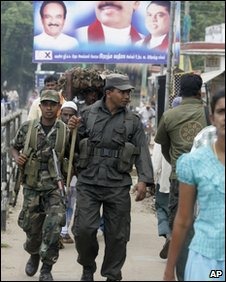 Sri Lanka has angrily rejected UN claims that footage which apparently shows extra-judicial killings by Sri Lankan troops is genuine.
Sri Lanka has angrily rejected UN claims that footage which apparently shows extra-judicial killings by Sri Lankan troops is genuine.
The government described a UN inquiry into the video’s authenticity as "highly subjective and biased". It says the footage was "fabricated".
UN human rights investigator Philip Alston earlier said three independent experts confirmed it was authentic.
The video shows a man dressed as a soldier shooting a man in the head.
The footage was allegedly filmed in January during the final stages of Sri Lanka’s bloody war with Tamil Tiger rebels.
After a man in army uniform shoots a naked, bound and blindfolded man in the back of the head, the video shows the bodies of eight others in a field nearby.
Mr Alston has called for a war crimes investigation.
‘Crusade’
"We don’t accept his conclusions and we believe his conclusions are highly subjective and biased," Human Rights Minister Mahinda Samarasinghe said of Mr Alston’s investigations into the footage.
"We believe he is on a crusade of his own to force a war crime inquiry against Sri Lanka."
Mr Samarasinghe said the government’s own investigation into the footage revealed that it was riddled with "discrepancies and shortcomings".
Mr Alston said that three independent experts had confirmed the video was authentic.
"The conclusion clearly is that the video is authentic," he said on Thursday.
He named the three investigators as Peter Diaczuk, an expert in firearms evidence, Daniel Spitz, a prominent forensic pathologist, and Jeff Spivack, an expert in forensic video analysis.
At the same time he noted that there were "a small number of characteristics of the video which the experts were unable to explain".
"Each of these characteristics can, however, be explained in a manner entirely consistent with the conclusion that the videotape appears to be authentic," he added.
The UN official called on the Sri Lankan government to hold an independent inquiry into possible war crimes committed by both sides of the conflict.
The video was provided to the BBC and other media organisations by a group called Journalists for Democracy in Sri Lanka, which said it showed "the reality of the behaviour of the government forces during the war".
Journalists for Democracy in Sri Lanka said the video had been taken in January 2009 using a mobile phone.
Analysts say that the row over the footage could complicate the country’s efforts to persuade international donors to pay for its costly post-war rebuilding plans.
Last month, a Sri Lankan newspaper printed allegations attributed to former army general Sarath Fonseka – who is running as a candidate in forthcoming elections – that the government had ordered rebels to be killed and not allowed to surrender.
(For updates you can share with your friends, follow TNN on Facebook and Twitter )
